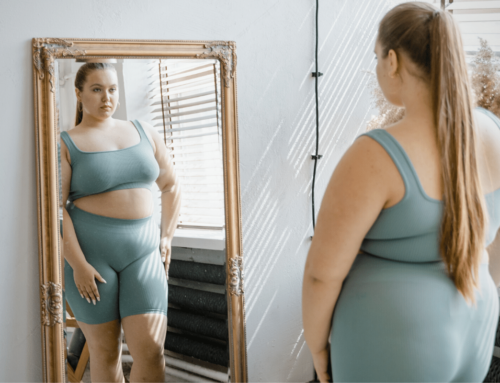
I was rooting around in my blog archives recently, and I came across a post I had written back in 2014 that still resonates with me today, especially in light of my latest article for The Washington Post, “The overlooked crisis of eating disorders in middle-aged women.” The article addresses perfectionism as one cause of midlife eating disorders. One of the women I interviewed for that article is clinical psychologist Margo Maine, who has written two important books on the topic: “The Body Myth: Adult Women and the Pressure to Be Perfect” in 2005 and “Pursuing Perfection: Eating Disorders, Body Myths, and Women at Midlife and Beyond” in 2016.
How is perfectionism related to eating disorders? The drive to be (or appear) perfect can trigger disordered eating patterns at various points along the spectrum. This could mean anything from occasional emotional/stress/comfort eating to orthorexia to full-fledged eating disorders like anorexia nervosa, bulimia nervosa and binge eating disorder.
The illusion of perfection
I wrote my 2014 post after attending the Renfrew Conference and listening to one of the keynote speakers, Deborah Spar. Spar is a former president of Barnard College and author of several books, most recently “Wonder Women: Sex, Power, and the Quest for Perfection.”
In her talk, Spar called herself a reluctant feminist, “not because I thought feminism was bad, but because I thought it was over. I didn’t think we needed it anymore.”
Spar was a professor and assistant dean at Harvard Business School before being named president of Barnard College. As one of the only women faculty members at HBS, the school asked her to fix the “women’s problem” the school was having (another good article on the issue here). She says this forced her to look at the “women’s problem” and the role of feminism in her own life and in the larger world.

“Why have we gotten stuck?”
Spar found that despite the fact that her students at Harvard Business School were extremely intelligent, extremely ambitious and quite capable of putting in long hours at future jobs, professional success was the norm for male graduates, while being the anomaly for female graduates. In fact, in almost every field, the number of women in leadership positions hovers around 16 percent (lower in the tech sector).
“Why have we gotten stuck?” she asked. She said it’s not a pipeline issue, as was once argued. “We’ve been filling the pipeline since the 1980s.”
“Girls are outperforming boys in almost every metric,” she said. In high school, girls are far more likely to be valedictorian, student body president and editor of the newspaper. More women go to college than men. More women apply to Ivy League schools. Women make up 50 percent of medical students and 44 percent of law students. Women earn 50 percent of the PhDs in the natural sciences.
“It’s not a pipeline problem,” Spar reiterated. “What’s happening is that women are falling out of the pipeline before they reach leadership positions.”
Co-opting feminism
Born in 1963, Spar said that women of her generation were still children during the dramatic societal changes that happened between 1963, when Betty Friedan published “The Feminine Mystique,” and 1978. These include the passage of the now-threatened Roe vs. Wade and Title IX, as well as increased access to birth control.
Her generation took for granted that they could be whatever they wanted to be, because they were the first generation of women to be told that. Advertising and media images that depicted career women as having it all also influenced them. Of special note are the two Charlies: Charlie perfume (see video below if you need a refresher) and “Charlie’s Angels.”
Privatizing feminism
Spar said her generation made two crucial mistakes about feminism.
- “We privatized feminism…we made it about our personal pursuit of perfection…that’s never what feminism was about.”
- “We actually ratcheted up the kinds and level of expectations that we placed on women and young girls.”
Tomorrow: Beauty myths and domestic goddesses—the seamy underside of what it means to be juggling all the time.
This post contains Amazon Affiliate links. As an Amazon Associate I earn from qualifying purchases.
Carrie Dennett, MPH, RDN, is a Pacific Northwest-based registered dietitian nutritionist, freelance writer, intuitive eating counselor, author, and speaker. Her superpowers include busting nutrition myths and empowering women to feel better in their bodies and make food choices that support pleasure, nutrition and health. This post is for informational purposes only and does not constitute individualized nutrition or medical advice.
Seeking 1-on-1 nutrition counseling? Carrie offers a 6-month Food & Body program (intuitive eating, body image, mindfulness, self-compassion) and a 4-month IBS management program (low-FODMAP diet coaching with an emphasis on increasing food freedom). Visit the links to learn more and book a free intro call to see if the program is a good fit, and if we’re a good fit!
 Print This Post
Print This Post






